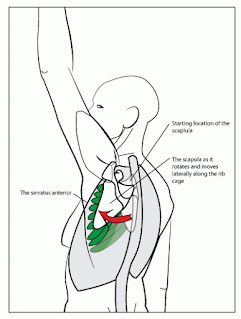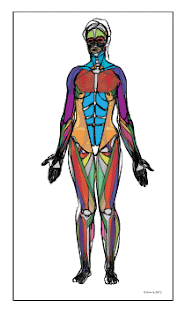I have been working on a project figuring out better ways to describe the muscles and the actions they help the body perform. I am doing this in order to understand the human form in ways that allow me to better illustrate the figure more accurately and have more of a range to express what I want to express. It is no easy, task that is for sure. Here is a sample of what I have been working on.
Today we will look at the muscle of the serratus anterior. This is a popular one to draw but is not always clearly visible on everyone. Below I break it down into two subjects, where the muscle is connected to the skeleton and how it move the arm.
Let's take a look.
 |
| Serratus Anterior (click on image for larger view) |
The Muscle
The serratus anterior is a muscle that is attached to both the scapula and the rib cage. This group of muscles is often called the boxing muscles because they are used in the punching action. These muscles are also very popular to draw in comic art. Very rarely will one see superman or batman drawing without this muscle b clearly defined. I think this is because when this muscle is visibly pronounced it demonstrates a very muscular figure.
First, let's attach the serratus anterior to the skeleton to understand where it belongs on the figure.
Starting with the fixed location, or the origin, the serratus anterior connects to the first through eight or nine ribs. There is variation in people so the number of slips (muscles found in the serratus anterior can vary) This connection to the rib cage is the anchor point for the muscles. This means the serratus anterior does not move the ribcage.
At the insertion, the point the muscles are fixed to the bone that they move. In this case, that would be the scapula. These muscles attach to the scapula on the side of the scapula facing the rib cage, this what is called the ventral surface. This means the muscles lay between the rib cage and the scapula.
The Action
 |
| An example of the serratus anterior rotating the scapula. |
The serratus anterior is the muscle group that assists in bringing your arm forward. This is because the serratus anterior acts on the scapula which, in turn, moves the arm.
When the muscles of the serratus anterior contract they pull the scapula along the side of the rib cage from the back towards the front, stopping at the lateral side of the rib cage. This brings the arm forward at the shoulder.
The serratus anterior also rotates the scapula as well. This is how the serratus anterior assists in raising the arm from its side. The lower end of the scapula (inferior angle) will move upwards as the serratus contracts. This will rotate the whole scapula allow the arm to not only move towards the center of the body (the medial plane) but raise upwards as well.
One not to clarify, the serratus anterior work in tandem with other muscles as well. For example, in the image to the right, the shoulder or deltoid is doing much of the work raising the arm, the serratus anterior is playing a supportive role.

